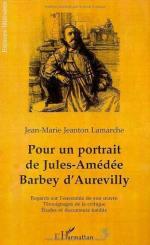|
This section contains 7,429 words (approx. 25 pages at 300 words per page) |

|
SOURCE: "Gödel's 'Incompleteness Theorem' and Barbey: Raising Story to a Higher Power," in Sub-Stance, No. 41, 1983, pp. 17-30.
Barbey and Escapism:
[In "Le bonheur dans le crime"], lasting happiness, combined with passion, is shown to rest on a basis of crime and murder. Somewhere, in Barbey's mind, an ideal 'island' of happiness existed, untouched by the disappointments he met with in his life. It is with this 'paradise' that the protagonists of "Le bonheur dans le crime" are intimately associated, 'immortal', dream-like figures, who live, as Barbey would have liked to live had his conscience let him, in a realm divorced from 'reality' altogether.
B. G. Rogers, in his The Novels and Stories of Barbey d'Aurevilly, 1967.
[Below, Moger discusses the significance of "Beneath the Cards of a Game of Whist" as a metafictional text, examining the following features of the story: multiple narrative layers, self-reflexive storytelling devices, emphasis...
|
This section contains 7,429 words (approx. 25 pages at 300 words per page) |

|


